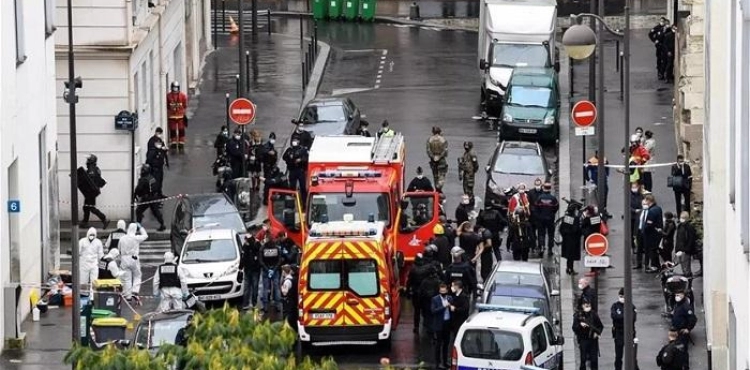After the Paris attack on Friday, which left two people seriously injured in Paris near the old Charlie Hebdo headquarters, the main suspect in the attack admitted that he justified his act by republishing the newspaper the cartoons of the Prophet Muhammad, saying that he He was targeting the satirical newspaper, according to sources close to the investigation.
The same source said that the actor believed that the targeted building still houses the editorial staff of the satirical newspaper Charlie Hebdo.
Police arrested the main suspect in Bastille Square shortly after the attack, which left two people in critical condition, who was born in Pakistan and is eighteen. He arrived in France three years ago when he was a minor.
The Friday attack took place as the trial continues for the deadly attack on the headquarters of the satirical weekly "Charlie Hebdo" in January 2015.
A young man with a white weapon attacked two people in front of the "Promier Linnae" news agency based in the building that housed the Charlie Hebdo headquarters in 2015.
"A man arrived and attacked with a machete two employees who were smoking in front of the building, a man and a woman," Paul Moreira, one of the directors of the "Promier Linnae", told AFP.
He explained that they were hit "in the upper body," one of them in the head.
But French Prime Minister Jean Castex, who came to the scene on Friday, confirmed that their lives were not in danger.
The French Interior Minister Gerald Darmanan had suggested that the attack was an "Islamic terrorist act." He explained in a statement to the French television station France 2 that the attack took place "in the street that included the headquarters of Charlie Hebdo, and this is the approach followed by Islamic terrorists, and there is no doubt. It is a new, bloody attack on our country. "
The French Anti-Terrorism Prosecutor took over the investigation of the case that commemorated the painful year 2015 in France during which it witnessed the attacks in January on Charlie Hebdo and the bloodiest ones on November 13th.
The attack came at a time when the editorial board of the Charlie Hebdo newspaper was under new threats since the republication of the Prophet Muhammad cartoons on September 2, coinciding with the start of the trial, which will last until November 10.
According to the police officers who arrested him, the main suspect confessed the facts and made the same statements to the investigators, according to a source familiar with the file justifying his work that he "could not bear the re-publication of the cartoons that represent the Prophet Muhammad."
According to Darmanan, in June he was arrested for possessing a white weapon, the "Prague screwdriver."
The Social Welfare Authority in the Paris region took care of him upon his arrival in France, and the suspect did not show "any sign of extremism" until he reached the age of majority last August.
Police carried out raids in his known places of residence, namely, a social hotel in Sergi and another in Bantan in the northern suburbs of Paris.
And the number of those arrested pending investigation on Saturday morning became seven, including five men who were in one of the main suspect’s homes in Bantan, where his neighbors described him as a "conservative" and "polite" young man.
On the other hand, an Algerian, thirty-three, who was present at the scene of the attack with a white weapon, was released after "his acquittal," according to the same judicial source.
According to a source familiar with the file, his account, which "consists in saying that he was a witness and tried to chase the perpetrator, and then he was threatened, was confirmed by the investigation." His lawyer, Lucy Simon, wrote on Twitter that he was "a young hero who tried to stop the aggressor."
On January 7, 2015, the brothers Sherif and Said Kouachi killed 11 people in an attack on the editorial board of the satirical weekly newspaper, before they fled and killed a policeman.
The next day, Amedi Coulibaly killed a policewoman in Montrouge, in the suburbs of Paris, and on January 9, four people, all Jews, were killed when he took hostages in the Iber Cashier on the eastern outskirts of Paris.
Police killed Coulibaly after they stormed the store, and the Kouachi brothers were killed by special forces in the French police at a printing press where they had taken refuge in Damartan-en-Jules, northeast of Paris.
A series of attacks in France since January 2015 have killed 258 people. Five years later, the terrorist threat level remains "very high," according to the Ministry of Interior.












